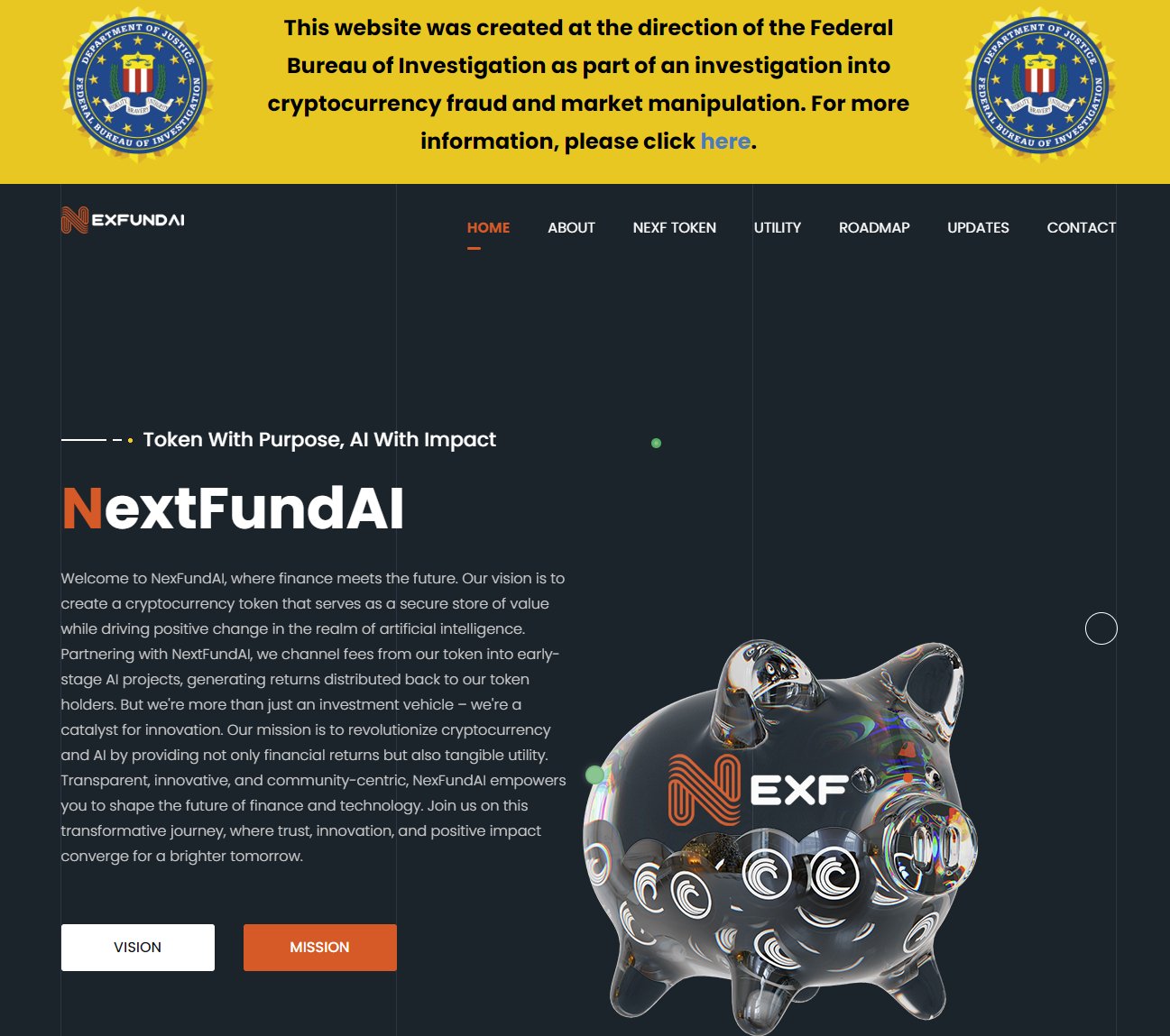On Wednesday, October 9, the US Department of Justice charged several individuals and companies in the cryptocurrency industry with market manipulation and "wash trading" for the first time. As part of an international operation, the Federal Bureau of Investigation (FBI) created its own token called NexFundAI to convict the suspects.
The defendants
The defendants include 15 people of different nationalities, aged between 26 and 50, who worked for various companies in the cryptocurrency industry (see ATTACHMENT A for a list of names).
A total of eight companies are involved or charged - four token issuers and four market makers. The four cryptocurrency companies Robo Inu Finance, Lillian Finance LLC, VZZN and Saitama LLC created tokens for different "alleged use cases" and marketed them with false claims in order to attract investors, artificially increase trading volumes and make the tokens appear to be good investments. They commissioned financial service providers (market makers) to carry out fake transactions (wash trading) with the tokens on various crypto exchanges (e.g. BitMart, LBank and XT.com). The simulated user activities caused the trading price of the tokens to rise and the defendants were able to scam millions of US dollars from duped investors using the usual "pump and dump" method. According to US prosecutor Joshua Levy, the largest of the accused companies, Saitama, had a market capitalization of USD 7.5 billion at times with its own token.
The accused market makers include Gotbit, ZM Quant, CLS Global and MyTrade. Executives and employees of these companies are alleged to have made a lot of money over the years by advertising special services for "wash trading" or market manipulation (pump and dump), offering them to numerous cryptocurrency companies and ultimately carrying them out on their behalf. The indictment alleges that they openly communicated with clients about the fraudulent schemes and developed various special trading bots to increase trading volume and "pump the price". In some cases, the fraudulent activities were also concealed by means of numerous wallets.
This investigation, the first of its kind, identified numerous fraudsters in the cryptocurrency industry. Wash trading has long been outlawed in the financial markets, and cryptocurrency is no exception. These are cases where an innovative technology – cryptocurrency – met a century old scheme – the pump and dump. The message today is, if you make false statements to trick investors, that’s fraud. Period. Our Office will aggressively pursue fraud, including in the cryptocurrency industry.
U.S. Attorney Joshua Levy
Operation Token Mirrors
During the investigations into these cases, the FBI founded a cryptocurrency company with its own ERC20 token called NexFundAI as part of the so-called "Operation Token Mirrors". The token was supposed to fill the missing gap between the crypto industry and artificial intelligence.

With this deception, the FBI was able to use the services of market makers ZM Quant, CLS Global and MyTrade to manipulate the trading volume of the token.
‘Operation Token Mirrors’ targeted nefarious token developers, promoters, and market makers in the crypto space. […] The FBI took the unprecedented step of creating its very own cryptocurrency token and company to identify, disrupt, and bring these alleged fraudsters to justice.
JodiCohen, Special Agent in Charge of the Federal Bureau of Investigation, Boston Division
The market makers openly communicated the fraud to potential customers or undercover FBI investigators, such as the founder of MyTrade, Liu Zhou:
The objective on the secondary markets is to find other buyers from the community – people you don’t know about or don’t care about. We have to make [the other buyers] lose money in order to make profit.
Liu Zhou, founder of MyTrade, talking to potential customers (undercover agents)
The NexFundAI token, which operates on the Ethereum blockchain and is classified as a security, was indeed traded, but the authorities allegedly took great care to minimize the risk of retail investors before disabling trading in the token. Those affected who have traded the NexFundAI coin or any of the other four coins of the accused crypto companies can contact the authorities.
Pleaded guilty
The FBI's deception ultimately led to the indictment of the three suspected market makers and the lead employees who manipulated the NexFundAI token on behalf of the FBI.
The fourth market maker, Gotbit, and its employees who defrauded investors in the Saitama and Robo Inu tokens were also indicted on similar charges of manipulation (or conspiracy to manipulate) and fraud. As mentioned above, the four other token issuers who deceived investors and also used the services of the market makers were also charged. In addition, the US Securities and Exchange Commission (SEC) also filed corresponding civil lawsuits for alleged violations of securities laws.
So far, three employees of Saitama and Liu Zhou of MyTrade have pleaded guilty - another defendant is also considering doing so. In addition, three other defendants have been arrested in Texas, Portugal and the UK and cryptocurrencies worth more than 25 million US dollars have been seized. The authorities have also deactivated several trading bots that carried out multi-million-dollar wash trades for around 60 different cryptocurrencies.
The sentence will be imposed by a federal district judge. A prison sentence of up to 20 years or substantial fines are provided for market manipulation, fraud by electronic means of communication or conspiracy to commit money laundering. Conspiracy to manipulate the market is punishable by up to five years' imprisonment. The sentence imposed could be decisive in determining how susceptibility to manipulation develops in the industry.
Conclusion: Watch out Shitcoins!
It is interesting to observe that law enforcement authorities are increasingly using technical means and are using their own weapons to convict the fraudsters. For token issuers and market makers considering such manipulation attempts, the authorities' approach should be a deterrent.
Ultimately, however, this case has shown how vulnerable this market still is to manipulation attempts and how unscrupulous some crypto projects are. It is another concrete criminal case that highlights the deliberate fraud surrounding the "pump and dump" scheme in the crypto industry, creates an understanding of this scam and should ultimately be a warning to all online investors. Investors should not be blinded by unfounded promises, unfinished concepts and spectacular marketing campaigns of certain tokens, even if the projects appear legitimate or already have certain network effects. You should always ask yourself which projects really make sense or have the potential to be better than other projects.
When dealing with Bitcoin, it becomes clear that Bitcoin is unrivaled in terms of decentralization, security, monetary properties and network effects. With a compact whitepaper and a solid basic concept that was ready before the network was launched, Bitcoin stands out from most cryptocurrencies. The pseudonymous discoverer of Bitcoin, Satoshi Nakamoto, did not enrich himself with previously created coins or promote the project with false statements to simulate high user activity. Bitcoin has grown organically and uniquely without manipulation and is still running stably without network outages. The lack of a central authority, the resistance to censorship, the network effects and the unbroken promise of genuine scarcity have made Bitcoin what it is today.









